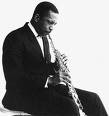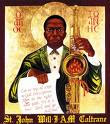Album:
My Favorite Things (1961)
(Az album egyenlőre jutubon, talán az atlantis és qogli nem elég éberek?
irta:
Richard Rodgers
játszák:
John Coltrane — soprano saxophone
McCoy Tyner — piano
Steve Davis — bass
Elvin Jones — drums
Au delà des 10 disques à amener sur une île déserte, "My favorite things" doit carrément s'inscrire au patrimoine de l'humanité. Si 5 messages doivent être envoyés à l'attention de probables extra-terrestres, quelques phrases de Coltrane sur "My favorite things" en feraient partie. Quelques mesures qui synthétisent les héritages orientaux et occidentaux sous la densité afro. Le détachement d'un thème abstrait, purement occidental, conduit par Mc Coy Tyner qui s'envole sous les volutes orientales de Coltrane et le grondement
ez érdekes találat volt, ha figyelembe veszem, hogy a "csak magyar oldalak" volt kiválasztva...
 | My Favorite ThingsJulie Andrews … 5人が購入/この動画で13人、全体で15人がクリック | |
 | ||
 | MY FAVORITE THINGS[オルゴールver]9人が購入/この動画で5人、全体で18人がクリック | |
Turtle Island Quartet performs "My Favorite Things"
My Favourite Things [The Sound of Music]
Bobby McFerrin acapella "My Favorite Things" In Copenhagen
McCoy Tyner Trio - My Favorite Things
Greg Pattillo - My Favorite Things (Beatboxing Flute)
Derek Trucks & Santana- My Favorite Things
MARIA JOÃO & AKI TAKASE (1) - "My Favorite Things/My Funny Valentine"
My Favorite Things (song)
From Wikipedia, the free encyclopedia
| "My Favorite Things" | |
 Soundtrack to the film version of The Sound of Music | |
| Music by | Richard Rodgers |
|---|---|
| Lyrics by | Oscar Hammerstein II |
| Published | 1959 |
| Language | English |
| Recorded by | Mary Martin (1959), John Coltrane (1960), Julie Andrews (1965), Herb Alpert & the Tijuana Brass(1968), and other various others |
"My Favorite Things" is a show tune from the 1959 Rodgers and Hammerstein musical The Sound of Music.
[edit]The Sound of Music version
The song was first introduced by Mary Martin in the original Broadway production, and sung by Julie Andrews in the 1965 film adaptation.
In the musical the lyrics to the song are a reference to things Maria loves such as 'raindrops on roses and whiskers on kittens, bright copper kettles and warm woolen mittens'. These are the things she selects to fill her mind with when times are bad.
The original Broadway musical places this song in the Mother Abbess's office, just before she sends Maria to serve Captain von Trapp's family as governess to his seven children. However, Ernest Lehman, the screenwriter for the film adaptation, repositioned this song so that Maria would sing it with the children during the thunderstorm scene in her bedroom, replacing "The Lonely Goatherd", which had originally been sung at this point. Many stage productions also make this change, shifting "The Lonely Goatherd" to another scene.
The wintertime imagery of some of the lyrics has made "My Favorite Things" a popular song during the Christmasseason, and it often appears on holiday-themed albums and compilations, although in the show and movie it is sung during a summer thunderstorm.
The first section of the melody has the distinctive property of using only the notes 1, 2, and 5 (Do, Re, and Sol) of the scale. Rodgers then harmonized this same section of the melody differently in different stanzas, using a series of minor triads one time and major triads the next.
The song's main melody seems derivative of Edvard Grieg's In the Hall of the Mountain King, particularly in its repetitive simplicity and its minor-key sense of dread. Put simply, the melody conveys terror. The happy, optimistic lyrics--"Cream-colored ponies and crisp apple strudel"--are just a counterpoint and cover-up to this undercurrent of fear. As noted above, the song was written to be sung by a young woman scared of facing new responsibilities outside the convent. In the film script the song is repositioned, with Maria singing it to the von Trapp children during the thunderstorm; but the terror contained in the melody is still the dominant emotion.
The song ends with a borrowed line of lyric and notes from Rodgers' earlier composition with Lorenz Hart, "Glad to Be Unhappy," a standard about finding peace in the midst of unrequited love. Using the same two notes for the phrasing of "so sad" in the original song, Rodgers brings the gloom of my "Favorite Things" to a similar upbeat ending – "and then I don't feel so bad."
[edit]Other versions
The song was a hit in 1968 by Herb Alpert & The Tijuana Brass on A&M 1001 (45rpm). The song has become a jazz standard, and has been performed by artists as diverse as:
- Alice Coltrane
- Amanda Palmer
- Andre 3000 of OutKast
- Andy Summers
- Andy Williams
- Anita Baker
- Barbra Streisand
- Béla Fleck
- Big Brovaz
- Bill Evans
- Brian Setzer
- Carmen Lundy
- On 26th November 2007 the track was released by British child singer Connie Talbot (who was discovered on the British television talent show Britain's Got Talent), on her debut album, Over The Rainbow. This album was re-released on the 16th June 2008 (with the Christmas tracks replaced).
- Los Crema Paraiso
- Dave Brubeck
- Dave Koz
- Diana Ross on "A Motown Christmas"
- Eddie Fisher
- Elis Regina has recorded the song in her fist album "Viva a Brotolandia" (1961) when she was 16 years-old. With lyrics in portuguese, this version was written by Fernando Cesar with arrangement by Severino Filho.
- The Derek Trucks Band
- Family Force 5
- Grant Green
- Hiromi Uehara
- John Coltrane (My Favorite Things (album))
- Kenny Rogers
- Kimiko Itoh
- The Lennon Sisters
- Lorrie Morgan
- Luther Vandross
- Mark Murphy
- Me First And The Gimme Gimmes
- The New Swing Sextet
- Rod Stewart
- Sarah Vaughan
- Stanley Jordan
- Stringmansassy
- Substantial
- Saigon
- Sun Ra
- Tartan Specials [1]
- The Supremes
- Tanya Tucker
- Tennessee Ernie Ford
- Tony Bennett
- Tony Rice
- Trisha Yearwood
- Vanessa-Mae
- 2Pac
Coltrane's album of the same name has been a landmark in the history of jazz for numerous reasons, not least for the rediscovery of soprano sax. One of the best vocal version is performed by Al Jarreau in his first album "1965".
The best instrumental rendition was recorded by modern contemporary saxophonist/songwriter/producer Alfonzo Blackwell on his 4th release, "The Time Is Now" in 2000. Alfonzo Blackwell is a post bebop musician whose take on this classic was an ode to his main influence, John Coltrane.
The song was mixed by audio-trickster collective Negativland on their album No Business, which was released in 2005. The Lennon Sisters' version of this song appeared in the film adaptation of Fear and Loathing in Las Vegas. The song is played during the beginning, juxtaposed with various images from the 1960s. "My Favorite Things" is also said to have been Michael Jackson's favorite song of all time, alongside Charlie Chaplin's "Smile".
The song was parodied on The Chaser's War on Everything as "My Least Favorite Things".
The song was also parodied in the bridge of the Panic! at the Disco song, "Build God, Then We'll Talk". The nature of the song as a list of objects lends itself to easy parodies with alternate objects, as was done by Doonesbury, Garfield, and many others.
The version sung by Tony Bennett was used in the HBO mini-series From the Earth to the Moon, in episode 4, "1968"
It has also been used recently in Cake, a 2007 advertisement for the Skoda Fabia. The same year, it was used in an advertisement for the MasterCard credit card. In the late 1980s and early 1990s, the song was used in commercials for Mitsubishi cars.
A filk version of the song with lyrics revolving around old age, first seen on the Usenet newsgroup alt.idiots in June 2001, has become attached to an urban legend claiming that it was sung by Julie Andrews herself at a benefit concert for AARP.[2][3]
Lil Wayne and Juelz Santana used the sample tune and different lyrics set to the tune in a song, "Favorite Things", on their Blow: The 'I Can't Feel My Face' Prequel album.
The song was included in the version of the complete musical The Sound of Music as performed at Dingwalls, London by Repetition and the Repetitions in 1980, comprising Nag and Bendle (from The Door and The Window) and Giblet (from the 49 Americans). The album was subsequently released on cassette.
This song is parodied in Billy Crystal's farewell song to comedian Jay Leno on Jay's second-to-last night as host of the Tonight Show. Crystal changes most of the lyrics into various car models.







j.jpg)
.jpg)
.jpg)


Nincsenek megjegyzések:
Megjegyzés küldése